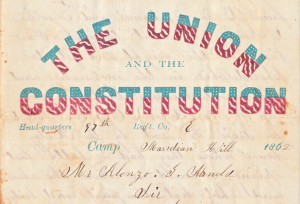Special Collections Spotlight: Arnold Civil War Letters
 The Arnold Civil War Letters (WP 2) are a new collection in the Missouri State University Libraries’ online digital collections. This project was a collaboration between Garnett Library on the Missouri State University – West Plains campus and Meyer Library’s Special Collections and Archives on Missouri State University’s Springfield campus.
The Arnold Civil War Letters (WP 2) are a new collection in the Missouri State University Libraries’ online digital collections. This project was a collaboration between Garnett Library on the Missouri State University – West Plains campus and Meyer Library’s Special Collections and Archives on Missouri State University’s Springfield campus.
John L. Arnold served in Company E of the 97th New York Regiment in the Union Army during the United States Civil War, and he was discharged as a captain in 1864. The fifty-one letters in this collection range mainly from 1860-1864, with one letter from 1856. Topics include his work at Carver General Hospital in Washington, D.C.; conditions of the troops when he was later sent to fight, including rations, weather, and receiving packages from home; speaking with “rebs,” taking prisoners, and nearly becoming a prisoner; and people he saw during his enlistment, including Abraham Lincoln and one of his sons. Battles mentioned include those of Fredericksburg, Bull Run, Gettysburg, Bristoe Station, and Cedar Mountain.
This interesting passage comes from his July 3, 1864 letter, when his regiment was near Petersburg, Virginia: “…when we first come here we was firing at one an other all the time, which done no good but to waist ammunition so our boys hollowed to the rebs and told them if they would stop firing we would, and there has been no firing since, our boys and the rebs walk around the trenches and fields as if there was no war going on. they say if we will whip our officers they will whip theirs and let that end the war.”
This collection was donated by alum Chuck Kimberlin in honor of his late mother, Irene Kimberlin. The original letters are held at Garnett Library, and digitization of the collection was completed at Meyer Library. For more information about this collection, contact Garnett Library or Special Collections and Archives.